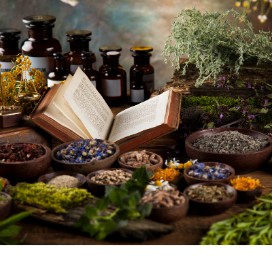
What Happens When You Take Too Many Herbs

In the world of holistic health, it’s easy to believe that “natural” means “harmless.” But just like anything we put into our bodies, herbs must be used with awareness and balance. Every herb carries its own energy, purpose, and potency. When used correctly, they support healing. When overused or combined carelessly, they can create new imbalances.
As an herbalist, I believe that education is one of the most important parts of wellness. Herbs are powerful allies, not quick fixes.
Understanding Herbal Potency
Herbs work gently, but that doesn’t mean they’re weak. Many contain active compounds that influence the body’s systems, from hormones to liver function. For example:
-
Licorice Root supports adrenal health, but when taken in large amounts or for long periods, it can raise blood pressure.
-
Black Cohosh helps with menopausal symptoms, but overuse can cause headaches or liver strain.
-
Kava Kava calms anxiety and promotes relaxation, yet it can affect the liver if used excessively.
This doesn’t mean these herbs are unsafe. It simply means that every body has limits, and balance matters.
Signs You Might Be Taking Too Much
If you’re self-blending teas or tinctures, pay attention to how your body responds. Common signs of herbal overload include:
-
Digestive upset or nausea
-
Dizziness or headaches
-
Skin irritation or rashes
-
Fatigue or restlessness
-
Changes in appetite or sleep patterns
These are your body’s signals to slow down, pause, or adjust your dosage. Listening to your body is the foundation of true healing.
The Importance of Herbal Guidance
One of the biggest misconceptions in holistic health is that everyone can take the same herbs. The truth is that herbal formulas work best when personalized. Age, diet, medication use, stress levels, and health history all affect how herbs interact with your body.
That’s why herbal consultations exist — to help you understand what your body needs and what it doesn’t. A trained herbalist can create custom blends that complement your unique system rather than overwhelm it.
Safe Herbal Use at Home
If you love using herbs in teas, tinctures, or capsules, here are a few safe-use tips:
-
Start small. Begin with a half dose and work your way up.
-
Rotate your herbs. Avoid taking the same formula for months without a break.
-
Stay hydrated. Herbs work best when the body is nourished and hydrated.
-
Read your labels. Avoid hidden fillers or synthetic additives.
-
Check for interactions. Always check with a qualified practitioner if you take medications or have health conditions.
Respecting the Plant’s Wisdom
Herbs are medicine, and like all medicine, they deserve respect. Each plant carries a story, chemistry, and healing spirit that works in harmony with the human body when used mindfully. The more we learn to listen to both our bodies and the plants, the more balance we create in our healing journey.
The Worthy of Blessings Approach
At Worthy of Blessings Herbal Wellness, every product is crafted with intention, care, and knowledge. Every formula is measured precisely and balanced to be both safe and effective. I believe in teaching people not only what to take but also how to take it responsibly.
Because herbal healing isn’t about taking more. It’s about taking what’s right for you.
✨ Ready to learn more about safe herbal use?
Book a consultation or explore Worthy of Blessings’ educational resources to deepen your understanding of herbs and holistic wellness.

